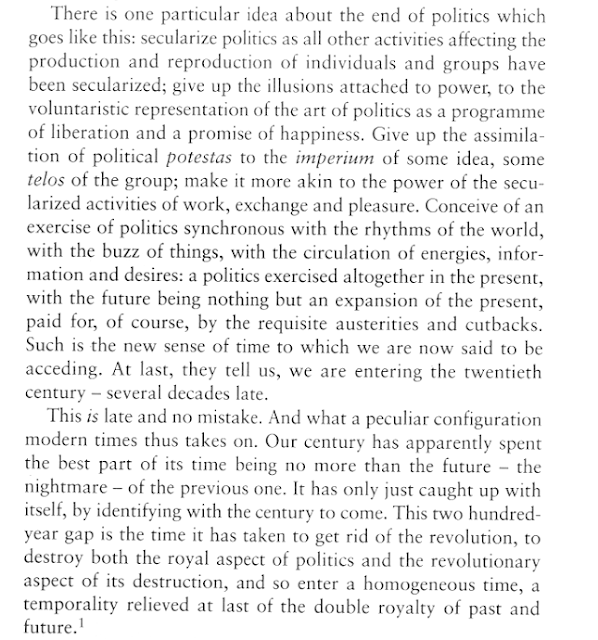The poor fetish: commodifying working class culture
 |
| Fruit stall in Shoreditch, London (Source: Flickr/Garry Knight) |
This inaction hurts the middle-class man. He feels impotent in the blue glare of his computer screen. Unable to do anything useful, alienated from physical labor and plagued by the knowledge that his father could use his hands, and the lower classes still do. Escape, however, is impossible. Ever since the advent of the smartphone the traditional working day has been abolished. Office workers are at the constant mercy of email, a culture of overwork and a digitalization of work. Your job can be done anytime, anywhere and this is exactly what capital demands. Refuge can only be found in sleep, another domain which capital is determined to control.
And when the middle classes are awake and working, they cannot even show contempt for their jobs. Affective (or emotional) labor has always been a part of nursing and prostitution, be it fluffing pillows or faking orgasms, but now it has infected both the shop floor of corporate consumer chains and the offices of middle-management above. Staff working at Pret-à-Manger are encouraged to touch each other, “have presence” and “be happy to be themselves.” In the same way the open plan, hyper-extroverted modern office environment enforces positivity. Offering a systemic critique of the very nature of your work does not make you a ‘team player.’ In such an environment, bringing up the pointlessness of your job is akin to taking a shit on the boss’s desk.
This culture is symptomatic of neoliberal contradiction, one which tells us to be true to ourselves and follow our passions in a system that makes it nearly impossible to do so. A system where we work longer hours, for less money and are taught to consume instead of create. Where fulfilling vocations such as teaching, caring or the arts are either vilified, badly paid or not paid at all. Where the only work that will enable you to have a comfortable life is meaningless, bureaucratic or evil. In such a system you are left with only one option: to embrace the myth that your job is your passion while on a deeper level recognizing that it is actually bullshit. This is London’s middle class crisis.
But thankfully capital has an antidote. Just as in Titanic, when Kate Winslet saps the life from the visceral, working class Leonardo DiCaprio, middle-class Londoners flock to bars and clubs that sell a pre-packaged, commodified experience of working class and immigrant culture. Pitched as a way to re-connect with reality, experience life on the edge and escape the bureaucratic, meaningless, alienated dissonance that pervades their working lives.
The problem, however, is that the symbols, aesthetics and identities that populate these experiences have been ripped from their original contexts and re-positioned in a way that is acceptable to the middle class. In the process, they are stripped of their culture and assigned an economic value. In this way, they are emptied of all possible meaning.
- From "The poor fetish: commodifying working class culture", by: Joseph Todd
And when the middle classes are awake and working, they cannot even show contempt for their jobs. Affective (or emotional) labor has always been a part of nursing and prostitution, be it fluffing pillows or faking orgasms, but now it has infected both the shop floor of corporate consumer chains and the offices of middle-management above. Staff working at Pret-à-Manger are encouraged to touch each other, “have presence” and “be happy to be themselves.” In the same way the open plan, hyper-extroverted modern office environment enforces positivity. Offering a systemic critique of the very nature of your work does not make you a ‘team player.’ In such an environment, bringing up the pointlessness of your job is akin to taking a shit on the boss’s desk.
This culture is symptomatic of neoliberal contradiction, one which tells us to be true to ourselves and follow our passions in a system that makes it nearly impossible to do so. A system where we work longer hours, for less money and are taught to consume instead of create. Where fulfilling vocations such as teaching, caring or the arts are either vilified, badly paid or not paid at all. Where the only work that will enable you to have a comfortable life is meaningless, bureaucratic or evil. In such a system you are left with only one option: to embrace the myth that your job is your passion while on a deeper level recognizing that it is actually bullshit. This is London’s middle class crisis.
But thankfully capital has an antidote. Just as in Titanic, when Kate Winslet saps the life from the visceral, working class Leonardo DiCaprio, middle-class Londoners flock to bars and clubs that sell a pre-packaged, commodified experience of working class and immigrant culture. Pitched as a way to re-connect with reality, experience life on the edge and escape the bureaucratic, meaningless, alienated dissonance that pervades their working lives.
The problem, however, is that the symbols, aesthetics and identities that populate these experiences have been ripped from their original contexts and re-positioned in a way that is acceptable to the middle class. In the process, they are stripped of their culture and assigned an economic value. In this way, they are emptied of all possible meaning.
- From "The poor fetish: commodifying working class culture", by: Joseph Todd



Comments
Post a Comment